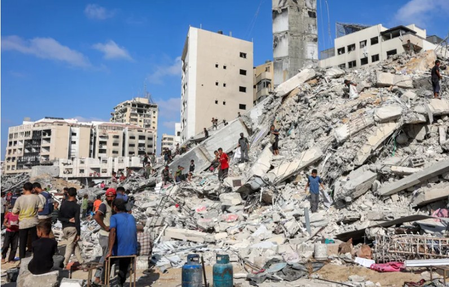
Gaza/Doha- Many residents of Gaza City are refusing to leave their homes despite Israel’s announcement of a new “humanitarian zone” in southern Gaza’s Khan Younis, created ahead of an expanded military push to seize control of the city.
“They want us to move to a place that is already overcrowded,” said Samer Abu Samra, a 38-year-old father of four. “We cannot afford transportation or tents. People are exhausted and hungry.”
Others echoed his concerns. Teacher Nasser al-Attar, who previously experienced displacement in the south, said: “The south is not safe either. Staying here is not about bravery — it’s because there is no alternative.”
For many, displacement carries a deeper cost. “We have nothing left to lose but our lives. But leaving also means losing dignity, so we will remain,” said Umm Mohammed Jaber.
Some, like Om Alaa Abu Ajwa, have even returned north despite the risks. “Life in the south has become impossible. At least we die in our city rather than in tents without water or food,” she said.
According to local activists, nearly 80 per cent of Gaza City’s residents have chosen to stay.
The Israel Defense Forces (IDF) said the designated “humanitarian zone” includes key infrastructure to support the delivery of food, medicine, tents, and medical equipment. The announcement came “in light of the expansion of the ground operation in Gaza City and the takeover of Hamas strongholds” under Operation Gideon’s Chariots II.
Meanwhile, Israeli airstrikes have intensified. On Friday, the 13-floor Mushtaha tower in western Gaza City was destroyed. Israel claimed Hamas had used the building for intelligence purposes, though its administration said it had only housed displaced civilians since last year. On Saturday, the 15-floor al-Sousi tower was also levelled, leaving nearby homes, shops, and streets in ruins.
“The bombardment aims to force residents to evacuate, turning entire neighbourhoods into empty areas,” said Mahmoud Basal, spokesperson for Gaza’s Civil Defence.
Hamas described the attacks as part of “a systematic policy of displacement” but reiterated its commitment to the 60-day ceasefire plan proposed by Qatar and Egypt on August 18. The group said any future deal must include a full Israeli withdrawal from Gaza, unconditional humanitarian access, and a prisoner exchange through internationally mediated negotiations.
Since Hamas’ October 2023 attack on southern Israel, which killed around 1,200 people and resulted in about 250 hostages being taken, Israel’s offensive has killed more than 64,000 Palestinians and wounded 161,000, according to Gaza health authorities.
On Saturday, Qatari Prime Minister Sheikh Mohammed bin Abdulrahman bin Jassim Al-Thani spoke with UK Foreign Secretary Yvette Cooper, urging stronger international efforts to end the conflict, secure the release of detainees, and ensure sustained humanitarian access.
With inputs from IANS